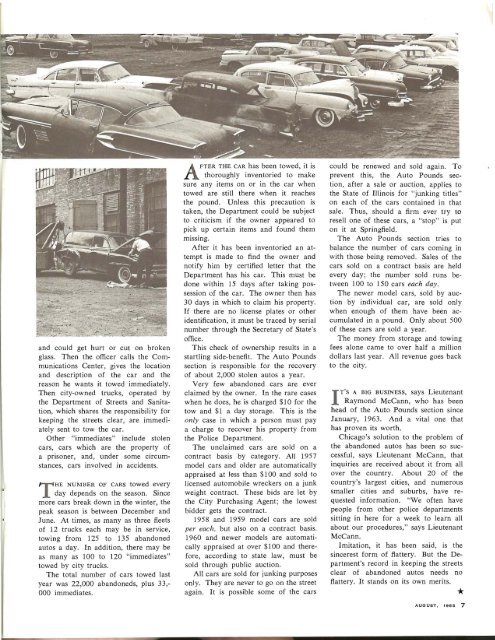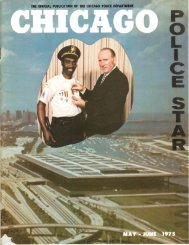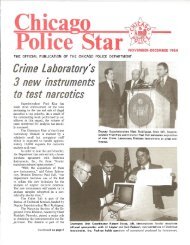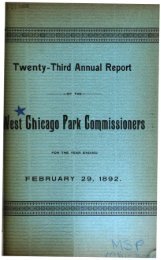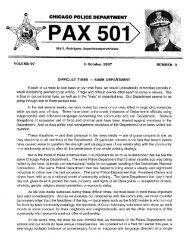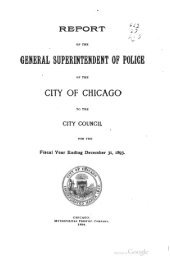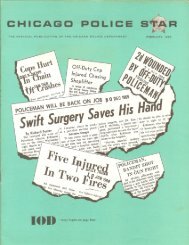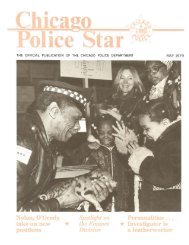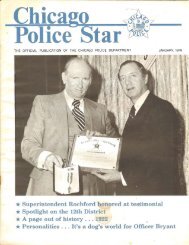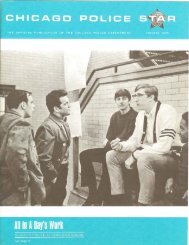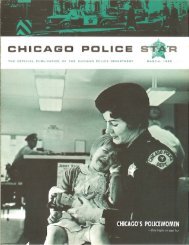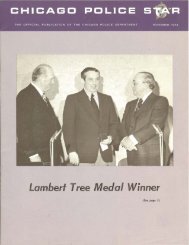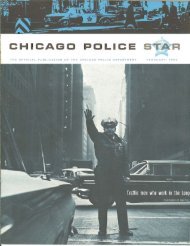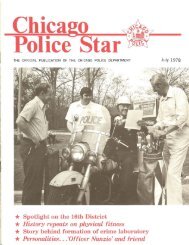You also want an ePaper? Increase the reach of your titles
YUMPU automatically turns print PDFs into web optimized ePapers that Google loves.
and could get hurt or cut on broken<br />
glass. Then the officer calls the Communications<br />
Center, gives the location<br />
and description of the car and the<br />
reason he wants it towed immediately.<br />
Then city-owned trucks, operated by<br />
the Department of Streets and Sanitation,<br />
which shares the responsibility for<br />
keeping the streets clear, are immediately<br />
sent to tow the car.<br />
Other "immediates" include stolen<br />
cars, cars which are the property of<br />
a prisoner, and, under some circumstances,<br />
cars involved in accidents.<br />
T HE<br />
NUMBER OF CARS towed every<br />
day depends on the season. Since<br />
more cars break down in the winter, the<br />
peak season is between December and<br />
June. At times, as many as three fleets<br />
of 12 trucks each may be in service,<br />
towing from 125 to 135 abandoned<br />
autos a day. In addition, there may be<br />
as many as 100 to 120 "immediates"<br />
towed by city trucks.<br />
The total number of cars towed last<br />
year was 22,000 abandoneds, plus 33,<br />
000 immediates.<br />
AFTER THE CAR has been towed, it is<br />
thoroughly inventoried to make<br />
sure any items on or in the car when<br />
towed are still there when it reaches<br />
the pound. Unless this precaution is<br />
taken, the Department could be subject<br />
to criticism if the owner appeared to<br />
pick up certain items and found them<br />
missing.<br />
After it has been inventoried an attempt<br />
is made to find the owner and<br />
notify him by certified letter that the<br />
Department has his car. This must be<br />
done within 15 days after taking possession<br />
of the car. The owner then has<br />
30 days in which to claim his property.<br />
If there are no license plates or other<br />
identification, it must be traced by serial<br />
number through the Secretary of State's<br />
office.<br />
This check of ownership results in a<br />
startling side-benefit. The Auto Pounds<br />
section is responsible for the recovery<br />
of about 2,000 stolen autos a year.<br />
Very few abandoned cars are ever<br />
claimed by the owner. In the rare cases<br />
when he does, he is charged $10 for the<br />
tow and $1 a day storage. This is the<br />
only case in which a person must pay<br />
a charge to recover his property from<br />
the Police Department.<br />
The unclaimed cars are sold on a<br />
contract basis by category. All 1957<br />
model cars and older are automatically<br />
appraised at less than $100 and sold to<br />
licensed automobile wreckers on a junk<br />
weight contract. These bids are let by<br />
the City Purchasing Agent; the lowest<br />
bidder gets the contract.<br />
1958 and 1959 model cars are sold<br />
per each, but also on a contract basis.<br />
1960 and newer models are automatically<br />
appraised at over $100 and therefore,<br />
according to state law, must be<br />
sold through public auction.<br />
All cars are sold for junking purposes<br />
only. They are never to go on the street<br />
again. It is possible some of the cars<br />
could be renewed and sold again. To<br />
prevent this, the Auto Pounds section,<br />
after a sale or auction, applies to<br />
the State of Illinois for "junking titles"<br />
on each of the cars contained in that<br />
sale. Thus, should a firm ever try to<br />
resell one of these cars, a "stop" is put<br />
on it at Springfield.<br />
The Auto Pounds section tries to<br />
balance the number of cars <strong>com</strong>ing in<br />
with those being removed. Sales of the<br />
cars sold on a contract basis are held<br />
every day; the number sold runs between<br />
100 to 150 cars each day .<br />
The newer model cars, sold by auction<br />
by individual car, are sold only<br />
when enough of them have been accumulated<br />
in a pound. Only about 500<br />
of these cars are sold a year.<br />
The money from storage and . towing<br />
fees alone came to over half a million<br />
dollars last year. All revenue goes back<br />
to the city.<br />
I T'S<br />
A BIG BUSINESS, says Lieutenant<br />
Raymond McCann, who has been<br />
head of the Auto Pounds section since<br />
January, 1963. And a vital one that<br />
has proven its worth.<br />
<strong>Chicago</strong>'s solution to the problem of<br />
the abandoned autos has been so successful,<br />
says Lieutenant McCann, that<br />
inquiries are received about it from all<br />
over the country. About 20 of the<br />
country's largest cities, and numerous<br />
smaller cities and suburbs, have requested<br />
information. "We often have<br />
people from other police departments<br />
sitting in here for a week to learn all<br />
about our procedures," says Lieutenant<br />
McCann.<br />
Imitation, it has been said, is the<br />
sincerest form of flattery. But the Department's<br />
record in keeping the streets<br />
clear of abandoned autos needs no<br />
flattery. It stands on its own merits.<br />
*<br />
AUGUST, f965 7


